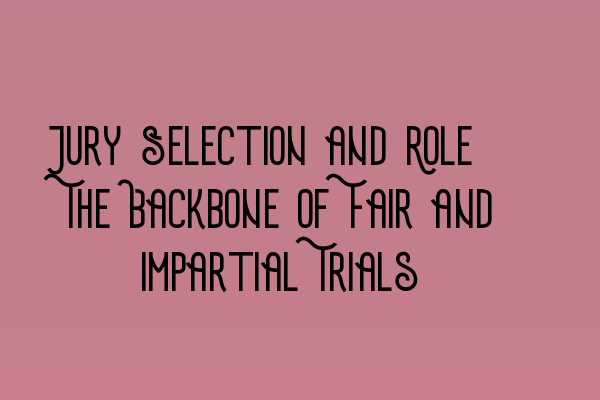Jury Selection and Role: The Backbone of Fair and Impartial Trials
Welcome to SQE Criminal Law & Practice Law UK! In this blog post, we will delve into the crucial aspect of jury selection and its role as the backbone of fair and impartial trials. A fair trial is a fundamental right, and an impartial jury is an essential component of achieving justice in the criminal justice system.
Before we begin, if you are preparing for the SQE 1 exam, we highly recommend checking out our SQE 1 Practice Exam Questions and SQE 1 Practice Mocks FLK1 FLK2 articles, as they provide valuable resources to enhance your preparation.
The Importance of Jury Selection
Jury selection, also known as voir dire, is the process by which potential jurors are questioned and evaluated to determine their suitability to serve on a jury. This process aims to select individuals who can provide an unbiased and impartial judgment based solely on the evidence presented during the trial. Proper jury selection is crucial to ensure fair trial proceedings.
By screening potential jurors, legal professionals can identify any biases, prejudices, or conflicts of interest that may hinder their ability to render an impartial verdict. This is essential for upholding the principle of fairness in criminal trials. In addition, jury selection allows for the inclusion of diverse perspectives, ensuring a more balanced and comprehensive decision-making process.
For comprehensive SQE 2 preparation courses, please visit our SQE 2 Preparation Courses article.
The Role of the Jury
Once the jury selection process is complete, the selected jurors play a vital role in the criminal trial. The jury’s responsibility is to carefully evaluate the evidence, apply the law as instructed by the judge, and ultimately reach a verdict of guilty or not guilty.
The jury’s duty to remain impartial throughout the trial is paramount. They must base their decision solely on the facts presented in court and not be influenced by personal beliefs or outside opinions. This ensures that justice is served objectively and without prejudice.
It is important to note that the jury does not determine the defendant’s guilt or innocence based on their own personal opinions or assumptions. Their role is to objectively evaluate the evidence and reach a verdict based on the standard of proof presented by the prosecution.
The Impact of Jury Selection on Fair Trials
The process of jury selection directly impacts the fairness and integrity of criminal trials. A jury comprised of unbiased and impartial individuals increases the likelihood of a just outcome. Conversely, a biased jury can undermine the defendant’s right to a fair trial.
To achieve a fair trial, legal professionals must carefully assess potential juror biases, whether explicit or implicit. Research has shown that unconscious biases can significantly influence decision-making, and it is crucial to address these biases during voir dire. By doing so, legal professionals can minimize the risk of prejudiced or unfair judgments.
For those preparing for the SQE 1 exam, we offer comprehensive SQE 1 Preparation Courses to help you succeed. Visit our website to find out more.
Conclusion
In conclusion, jury selection and its role in fair and impartial trials are fundamental to the criminal justice system. The process of selecting an unbiased and diverse jury ensures that defendants receive the fair trial they deserve. Legal professionals must diligently assess potential juror biases and strive for a balanced and equitable jury composition.
If you would like to stay updated on the latest SRA SQE exam dates and other important information, check out our SRA SQE Exam Dates article.
Thank you for reading, and remember, justice can only be achieved when fair and impartial juries participate in the legal process.
